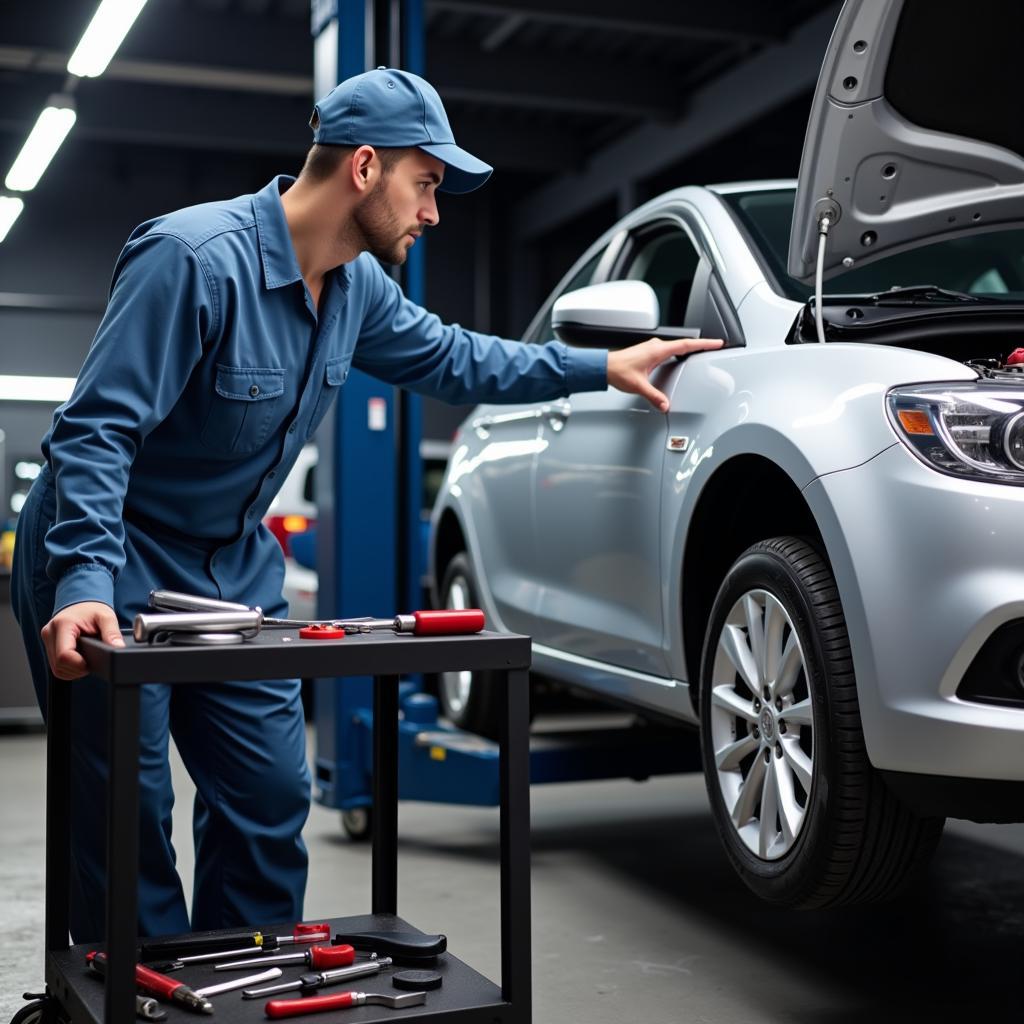Purchasing a rebuilt car can be an appealing option, offering potential cost savings compared to a brand new vehicle. However, it’s essential to be aware of the potential problems that can arise with rebuilt cars. These issues can stem from anything, from previous damage to the quality of the rebuild itself. This comprehensive guide will delve into common Problems With Rebuilt Cars, equipping you with the knowledge to make an informed decision and handle any challenges that may come your way.
Unmasking the Issues: Common Problems Found in Rebuilt Cars
While a well-rebuilt car can provide reliable transportation, there are several areas where problems are more likely to surface:
1. Engine and Transmission Troubles
The heart of any vehicle lies in its engine and transmission, and rebuilt cars can sometimes exhibit issues in these areas. These issues can range from oil leaks and unusual noises to more severe problems like difficulty shifting or reduced power.
What to do: Always obtain a comprehensive pre-purchase inspection by a trusted mechanic specializing in rebuilt vehicles. They can identify potential red flags and assess the overall health of the engine and transmission.
2. Electrical System Gremlins
Electrical problems can be a common source of frustration in rebuilt cars. These can manifest as faulty wiring, malfunctioning sensors, or issues with lights and electronic components.
What to do: Check all electrical systems thoroughly during a test drive. Pay close attention to the functionality of lights, windows, air conditioning, and the entertainment system. If you notice any inconsistencies, it’s crucial to have them addressed before purchasing the vehicle.
3. Suspension and Steering Discrepancies
A rebuilt car’s suspension and steering systems are crucial for a smooth and safe driving experience. Problems in these areas can lead to uneven tire wear, a bumpy ride, and difficulty controlling the vehicle.
What to do: During a test drive, pay close attention to how the car handles various road conditions. Look out for any pulling to one side, vibrations in the steering wheel, or excessive noise when going over bumps.
 Mechanic Inspecting a Rebuilt Car
Mechanic Inspecting a Rebuilt Car
4. Frame and Structural Imperfections
If the car has been in a major accident, its frame might have sustained damage. Even with professional repairs, there’s a chance that structural imperfections could lead to issues with alignment, handling, and even safety.
What to do: Insist on a detailed vehicle history report from reputable sources like Carfax or AutoCheck. This report can reveal past accidents and provide insights into the extent of any previous damage.
5. Cosmetic Imperfections and Mismatched Parts
While not always a sign of a poorly rebuilt car, cosmetic imperfections like mismatched paint, panel gaps, or interior inconsistencies can indicate a rushed or low-quality rebuild.
What to do: Carefully inspect the vehicle’s interior and exterior for any signs of mismatched parts, inconsistent paint, or shoddy workmanship. While minor cosmetic issues might not affect performance, they could point towards a larger pattern of neglect.
Expert Insights: Advice from the Trenches
John Miller, a seasoned automotive engineer with over 20 years of experience, shares his perspective: “When considering a rebuilt car, remember it’s a case of ‘trust but verify.’ A reputable rebuilder will be transparent about the car’s history and the work done. Don’t hesitate to ask for documentation and warranties.”
Mitigating the Risks: Tips for Buying a Rebuilt Car
Despite the potential problems, purchasing a rebuilt car can still be a viable option if you proceed with caution. Here are some tips to help you make a wise decision:
-
Thorough Research is Key: Invest time in understanding the car’s history, the specific model’s common issues, and the reputation of the rebuilder.
-
Professional Inspection is Non-Negotiable: Never skip a pre-purchase inspection by a trusted mechanic. This step is crucial for uncovering any hidden problems.
-
Verify Documentation: Ask for detailed records of the rebuild, including parts used, labor performed, and any warranties offered.
-
Test Drive Under Various Conditions: Take the car on a thorough test drive that includes city streets, highways, and varying road surfaces to assess its handling and performance.
Conclusion: Proceed With Knowledge and Caution
While problems with rebuilt cars can arise, understanding the common issues and following the recommended precautions can significantly reduce your risk. Remember, a well-researched and thoroughly inspected rebuilt car can be a cost-effective and reliable mode of transportation.
If you need assistance with any car troubles or require expert advice, don’t hesitate to contact AutoTipPro at +1 (641) 206-8880 or visit our office at 500 N St Mary’s St, San Antonio, TX 78205, United States.
FAQ
1. Are rebuilt cars safe?
A: A properly rebuilt car can be just as safe as a non-rebuilt one. However, ensuring this requires a reputable rebuilder, thorough inspections, and high-quality repairs.
2. Do rebuilt cars come with warranties?
A: Reputable rebuilders often offer warranties on their work, but the coverage and terms can vary. Always clarify this before making a purchase.
3. Can I finance a rebuilt car?
A: Financing options for rebuilt cars can be limited compared to new or used vehicles. Check with banks and credit unions to explore your options.
4. Should I buy a rebuilt car with a salvage title?
A: Cars with salvage titles have been declared a total loss by insurance companies. While they can be significantly cheaper, they often come with a higher risk of hidden problems and might not be eligible for standard insurance coverage. Exercise extreme caution.
5. What is the average lifespan of a rebuilt car?
A: The lifespan of a rebuilt car depends on various factors, including the quality of the rebuild, the extent of previous damage, and how well it’s maintained. A well-rebuilt and properly maintained vehicle can last for many years.




Leave a Reply